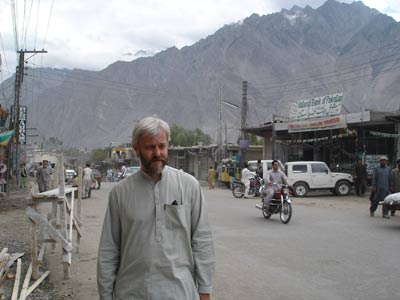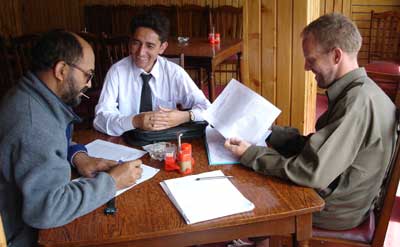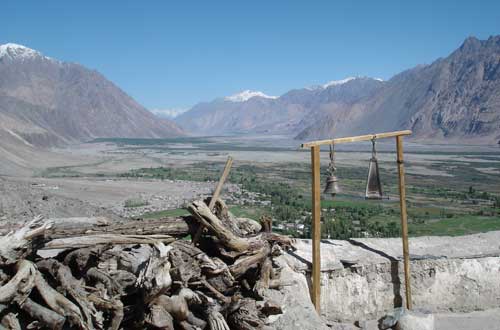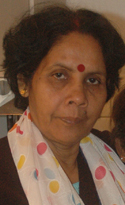SWEDISH SOUTH ASIAN STUDIES NETWORK
School of Social Work, Lund university
Address: Bredgatan 13, SE-221 00 Lund, Sweden
Web page: http://www.soch.lu.se/o.o.i.s/15649
Contact persons: Dr. Jan Magnusson, Lecturer, phone: +46 (0) 46 222 3161
The research of the department has been wide in range, but has concentrated on some central research areas and programmes. The thematic research areas that we use to describe our research are social policy, esp. poverty, income maintenance and social services; social problems and support measures during the life course, e.g. children and child care, aging and elderly care, addiction and treatment of addicts; the organisation of social work and institutional care; the influence of users and users’ organisations on services and, finally, studies of methods, outcomes and purposefulness.
The School of Social Work has sent several batches of students on field work trips to India. For many years up till 2007 this was done through the
SWEDEN-INDIA Project, as it is called. This is an Indian-Swedish educational project providing experiential, field
based training programme for social work students, organised by Örebro University since 1994. More information.
Since then, Lund University has decided to organise their own fieldwork arrangements in India. In March 2011, such an agreement was made with Tata Institute of Social Sciences (TISS) in Mumbai.![]()
South Asia related research at the department
Dr. Jan
Magnusson,
closely connected to SASNET from the beginning (being its first
webmaster, and for the past few years being a member of the board),
was based at the Centre for East and South-East Asian Studies (ACE) from 2003 till 2005, developing and coordinating the then brand new Masters
programme in Asian Studies. Since 1 January 2006 he is however
back at the School of Social Work, his home institution, where
he defended his
PhD thesis about Swedish street papers (”Ny situation – ny organisation. Gatutidningen Situation Sthlm 1995–2000”) in 2002 (more
information about the thesis).
Jan Magnusson participated in the SASNET workshop
on ”The
role of South Asia in the internationalisation of higher education in Sweden” held
in Stockholm 28-29 November 2006, where he gave a presentation about
experiences from the masters programme
both in the session dealing with ”South Asian students in
soft sciences in Sweden” (read
the presentation, as a pdf-file); and in the session dealing with
”Sending students to South Asia” (read
this presentation, as a pdf-file).
 For several years Dr. Magnusson has been involved in Tibetan studies,
looking especially at the social dynamics and development of the Tibetan
refugee community in India. He has also initiated
a research project dealing with the so called Baltistan movement and
the revival of Tibetan identity in Baltistan (an area located in the
north eastern part of Pakistan). At the Development studies research
conference in Lund in January 2003 he presented a paper titled ”The
Baltistan Movement and the Emergence of Tibetan Identity in the Northern
Areas of Pakistan”. Read
the abstract.
For several years Dr. Magnusson has been involved in Tibetan studies,
looking especially at the social dynamics and development of the Tibetan
refugee community in India. He has also initiated
a research project dealing with the so called Baltistan movement and
the revival of Tibetan identity in Baltistan (an area located in the
north eastern part of Pakistan). At the Development studies research
conference in Lund in January 2003 he presented a paper titled ”The
Baltistan Movement and the Emergence of Tibetan Identity in the Northern
Areas of Pakistan”. Read
the abstract.
In August 2003 Jan Magnusson was awarded 70 000 SEK as a SASNET
planning grant to develop the research project about the Baltistan
Movement (”The Baltistan Movement
in the Northern Areas, Pakistan”). The object
of study has been national and political identities in a region consisting
of not only Baltistan, but also of Kargil and Ladakh in India.
Partners
in the project have been Ole Jensen from
the International Development Studies, Roskilde University, Denmark,
and Mohammad
Hassan from Skardu
College in Pakistan. In summer 2004 the team carried out field work
in Baltistan and met with political and cultural activists as well
as radical journalists. The results of the fieldwork was first presented
in a panel at the Tenth
International Seminar of Tibetan Studies held
in Oxford, UK, in September 2003. Data collected in Baltistan in 2004
were later used for a paper called ”The
Baltistan Movement: Tibetan History and Identity in the Northern Areas
of Pakistan” appearing in a volume called ”Tibetan
Borderlands”,
edited by Dr P Christiaan Klieger, and
published by Brill.
 |
| Mohammed Hassan to the left, and Ole Jensen to the right meet the Baltistani journalist Manzoor Hussain Parwana during their 2004 fieldwork in Skardu. |
In 2005 the team planned to work in Kargil and Ladakh.
The purpose was to look at Balti influence as well as to trace cross-border
interaction and establish contacts for future studies. Ole Jensen withdrew
from the project in early 2005, and unfortunately Mohammad Hassan got
his Indian visa application rejected. Jan Magnusson went to Ladakh on his own,
and spent about a month in Ladakh, Kargil and Nubra during the summer
2005 where he met with local leaders and intellectuals to talk about
Ladakh’s and Kargil’s
relationship to Baltistan and future scenarios. He also interacted with
Dr Sonam Joldan, a researcher living in Ladakh
and recently got his PhD in Political Science from JNU in New Delhi.
Project description: Due to the recent anti-Islamic
sentiments in Ladakh Magnusson found the Ladakhi attitude towards Baltistan
rather negative, and many of the persons he spoke to seemed to fear an
opening of the border. The primary reason for this was the possibility
of Balti dominance as the combined Balti population on both sides of
the border outnumbers the Ladakhis. In Kargil, by contrast, the attitude
was extremely positive. This is due to the fact that about 80 percent
of the population there is of Balti decent. For the last decade Kargil,
like Baltistan, has experienced a cultural revival, and are in fact a
main producer of Balti cultural products. Interaction between Kargil
and Baltistan is increasing, not so much as a cross-border activity but
more as meetings during pilgrimage to Mecca and other places in the Middle
East as well as religious schools mainly in Iran. People in Kargil have
high hopes for an opening of the border.
 |
| View over the Shyok river valley with the village Diskit. |
During his visit in Kargil, Magnusson realized that the Balti movement is just as strong there as it is in Baltistan itself, something that may have very interesting trans-Himalayan consequences. Magnusson also visited Nubra, two valleys north of the Ladakh Range. Nubra river valley runs north up to the Siachen glacier area while the Shyok river valley runs north-west up into Baltistan (unfortunately most of the Shyok valley is still a restricted area which only allowed him to go as far down the valley as a short distance beyond the village Hunder. The majority of Baltis in the area reside farther down the valley, mainly in the village Turtuk. Some of the villages in the valley were annexed by India during the 1971 war. 60-70 percent of the Baltis who live there are Nurubakshi muslims. They are comparatively well organized and run a welfare organization called Skarchen. Skarchen is in close contact with Kargil for instance in the production of Balti music recordings. It was originally intended to care only for the Baltis but has extended its activities to all people living in the Nubra area.
In October 2004 Magnusson was given a small Swedish
Research Links grant for another Tibet related research project, now
titled ”Life strategies in long-term
refugee settlements: The social dynamics of the Tibetan refugee settlement
Lugsum Samdupling in Karnataka, India”. The project
is carried out in cooperation with Dr Subramanya
Nagarajarao, Indian Research Institute,
Mysore and Dr Geoff
Childs, Dept. Of Anthropology,
Washington University, St Louis., USA.
Project Abstract: The general aim of the project is
to study the life strategies that are developed by refugees in long-term
camp settings and the social dynamics they create within the community
and with the local environment. More specifically the project looks
at these dynamics in the six camps of the first of the Tibetan refugee
settlements established in India, namely in Bylakuppe, Lugsung Samdupling,
from 1961 and up until present day. This case can serve as an example
of many lessons when it comes to the understanding of the social dynamics
at work in long-term refugee situations. More specifically the project
studies the demographic development in the settlement population, and
the interplay and interaction between the settlement and its local
environment over time. It also looks at changes in the refugees´way
of life and how the community has been socially reconstructed.
The project included a workshop to explore the possibilities
of extending a study of Tibetan refugee settlements in the south Indian
state of Karnataka, also to settlements and scattered communities in
other places all over India. A report from the symposium is published
at ACE’s website.
More information on the 2004 Swedish Research
Links grants.
Other South Asia related activities
 On Wednesday 16 September 2009, the School of Social Work at Lund university hosted a seminar
with Dr. Ruby Sain from the Dept. of Sociology, Jadavpur University, Kolkata, India. The seminar was organised in collaboration with Vårdalinstitutet (The Swedish Institute for Health Sciences), and SASNET.
On Wednesday 16 September 2009, the School of Social Work at Lund university hosted a seminar
with Dr. Ruby Sain from the Dept. of Sociology, Jadavpur University, Kolkata, India. The seminar was organised in collaboration with Vårdalinstitutet (The Swedish Institute for Health Sciences), and SASNET.
Dr. Sain, who mostly works on health, illness, ageing, religion and research methodology issues, talked about “Depression – a social problem of the elderly
population in India”. She is the founding editor of the Jadavpur University Journal of Sociology, and her forthcoming books are titled ”Contemporary Social Problems in India-Vol I” (ed.) and ”Folk Religion in Bengal”. Besides, Dr Sain is secretary of the International Forum for the Study of Society and Religion (IFFSR), a forum that links researchers and scholars from Jadavpur University, University of Gothenburg and the Oxford Center for Hindu Studies.
She came to Sweden on a SASNET guest lecture programme grant, invited by the Department of Literature, History of Ideas, and Religion, Gothenburg University, and Vårdalinstitutet, Lund University. More information.
SASNET - Swedish South Asian Studies Network/Lund
University
Address: Scheelevägen 15 D, SE-223 70 Lund, Sweden
Phone: +46 46 222 73 40
Webmaster: Lars Eklund
Last updated
2011-04-21
